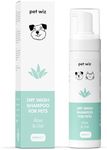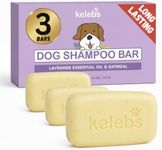Buying Guide for the Best Cat Shampoos
Choosing the right cat shampoo is essential for maintaining your feline friend's coat and skin health. Cats are known for their grooming habits, but sometimes they need a little help, especially if they have skin conditions, fleas, or have gotten into something messy. When selecting a cat shampoo, it's important to consider your cat's specific needs, such as skin sensitivity, coat type, and any existing skin conditions. Always ensure the shampoo is specifically formulated for cats, as their skin has different pH levels compared to humans or dogs.FormulationThe formulation of a cat shampoo refers to the ingredients and their purpose. This is important because cats have sensitive skin, and the wrong ingredients can cause irritation or allergic reactions. Formulations can be divided into hypoallergenic, medicated, flea and tick, and general cleansing. Hypoallergenic shampoos are best for cats with sensitive skin or allergies. Medicated shampoos are designed to treat specific skin conditions like fungal infections or dandruff. Flea and tick shampoos help in controlling parasites. General cleansing shampoos are suitable for regular use on healthy cats. Choose a formulation based on your cat's skin condition and grooming needs.
ScentThe scent of a cat shampoo can affect both you and your cat. While a pleasant scent might be appealing to you, it's important to remember that cats have a much stronger sense of smell. Strong fragrances can be overwhelming or irritating to them. Shampoos can be unscented, lightly scented, or heavily scented. Unscented or lightly scented shampoos are generally better for cats, especially if they are sensitive to smells. Consider your cat's tolerance to scents and your own preference when choosing the right shampoo.
pH BalancepH balance in cat shampoos is crucial because it ensures the product is gentle on your cat's skin. Cats have a different skin pH compared to humans, so using a shampoo with the wrong pH can lead to dryness or irritation. Cat shampoos are typically formulated to match the natural pH of a cat's skin, which is slightly more acidic than human skin. Always choose a shampoo that is specifically labeled as pH balanced for cats to maintain healthy skin and coat.
Coat TypeDifferent cat breeds have different coat types, which can affect the type of shampoo you should use. Coat types can be short, medium, or long, and some cats have more oily coats while others have dry coats. Shampoos for long-haired cats often contain conditioners to help detangle and prevent matting. For short-haired cats, a basic cleansing shampoo might suffice. If your cat has an oily coat, look for a shampoo that helps control oil without stripping the coat of its natural moisture. Consider your cat's coat type and any specific grooming challenges when selecting a shampoo.
Skin SensitivitySkin sensitivity is an important factor to consider when choosing a cat shampoo. Some cats have more sensitive skin than others, which can be prone to irritation or allergic reactions. Shampoos for sensitive skin are typically free from harsh chemicals, dyes, and fragrances. They often contain soothing ingredients like oatmeal or aloe vera. If your cat has shown signs of skin sensitivity, such as redness, itching, or flakiness, opt for a shampoo specifically designed for sensitive skin to avoid exacerbating these issues.















